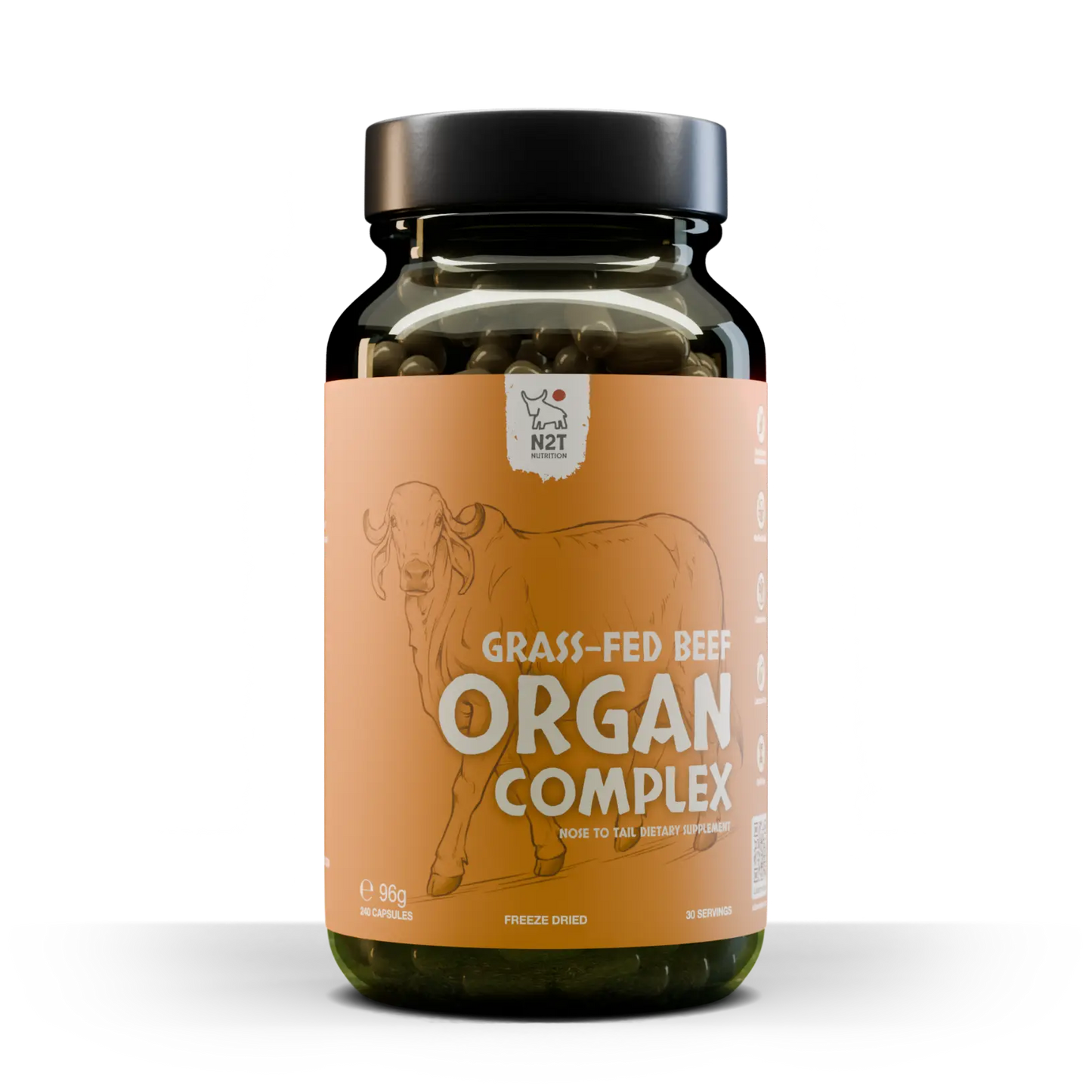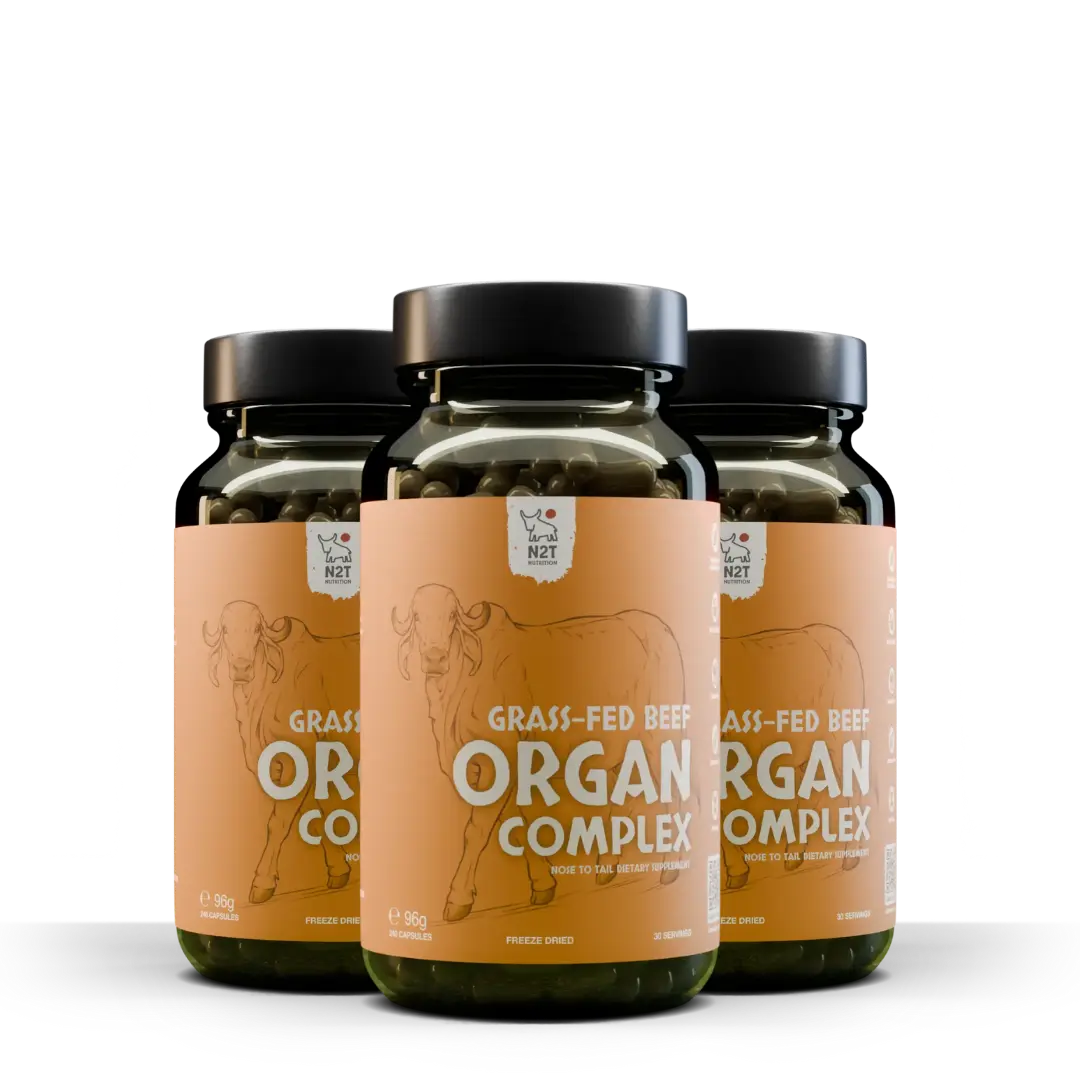





-
🌱 Zertifiziert ökologisch und grasgefüttert bis zur Schlachtung:
Unsere Produkte stammen von Rindern, die ausschließlich und bis zur Schlachtung grasgefüttert werden, was bedeutet, dass sie ihr ganzes Leben lang auf nährstoffreichen Weiden weiden. Grasgefütterte Rinder werden niemals mit Getreide gefüttert, was sicherstellt, dass sie von Anfang bis Ende optimale Ernährung erhalten. Diese ökologisch bewirtschafteten Weiden bleiben frei von synthetischen Pestiziden oder Düngemitteln und bieten eine reine und natürliche Ernährung für unsere Tiere. Diese Herangehensweise unterstützt nicht nur das Wohlbefinden der Rinder, sondern verbessert auch die ernährungsphysiologische Qualität der Fleischprodukte und bietet dir ein überlegtes , nachhaltiges und ganzheitliches Produkt.
Warum ist das wichtig? Produkte von Rindern, die ausschließlich und bis zur Schlachtung grasgefüttert werden, sind nicht nur nachhaltiger und tierfreundlicher, sondern sind auch reich an essentiellen Nährstoffen sind. Diese Produkte weisen eine höhere Bioverfügbarkeit auf, was bedeutet, dass der Körper die Nährstoffe leichter aufnehmen und nutzen kann²¹. Rindfleisch von grasgefütterten Tieren ist besonders reich an Vitaminen wie A und E sowie an Antioxidantien und gesunden Fetten wie Omega-3-Fettsäuren²¹. So wird außerdem sichergestellt, dass keine synthetischen Hormone oder Antibiotika verwendet werden, was es zu einer gesünderen Wahl macht.
-
💊Gelatinekapsel: Bei N2T verwenden wir bovine Gelatinekapseln für unsere Nahrungsergänzungsmittel und setzen damit auf natürliche und hochwertige Zutaten in allen Aspekten unserer Produkte. Bovine Gelatinekapseln bestehen aus tierischem Kollagen und sind daher eine natürliche, leicht verdauliche und hochkompatible Wahl für die Verkapselung von Nahrungsergänzungsmitteln. Sie bieten eine ausgezeichnete Bioverfügbarkeit, sodass dein Körper die in der Kapsel enthaltenen Nährstoffe effektiver aufnehmen kann.Im Gegensatz zu HPMC-Kapseln (Hydroxypropylmethylcellulose), die synthetisch aus Pflanzenfasern hergestellt werden und häufig verwendet werden, um eine EU-Bio-Kennzeichnung zu erreichen, wählen wir bovine Gelatine, um die Integrität unserer Produkte zu wahren und sicherzustellen, dass jeder Bestandteil unserer Nahrungsergänzungsmittel so natürlich wie möglich ist. Diese Wahl spiegelt unser Engagement für Nachhaltigkeit, traditionelle Prinzipien und das allgemeine Wohlbefinden unserer Kunden wider.
-
🥩Rindfleisch und seine Bioverfügbarkeit: Rindfleisch-Innereien bieten eine unübertroffene Bioverfügbarkeit, was bedeutet, dass der Körper die Nährstoffe leichter aufnehmen und nutzen kann, was es zu einer überlegenen Quelle essentieller Nährstoffe für die menschliche Gesundheit macht. Hochdosiert mit leicht absorbierbaren Vitaminen, Mineralien und vollständigen Proteinen, stimmt Rindfleisch eng mit der menschlichen Biochemie überein. Sein vorteilhaftes Fettprofil und seine effiziente Verdaulichkeit gewährleisten eine maximale Nährstoffaufnahme. Im Gegensatz zu pflanzlichen Quellen liefert Rindfleisch Nährstoffe in Formen, die unser Körper leicht nutzen kann, was die allgemeine Vitalität und das Wohlbefinden unterstützt. Wähle unser Rinderinnereien Nahrungsergänzungsmittel für die effektivste und natürliche Möglichkeit, deinen Körper zu ernähren.
-
❄️ Gefriertrocknung: Unsere Nahrungsergänzungsmittel werden gefriergetrocknet, um sicherzustellen, dass die Produkte die höchste Nährstoffdichte beibehalten. Diese schonende Methode entfernt Feuchtigkeit bei niedrigen Temperaturen und bewahrt natürliche Vitamine, Mineralien, Enzyme und andere lebenswichtige Verbindungen. Im Gegensatz zu Konservierungverfahren von Dosenprodukten und Trocknungsverfahren die Hitze verwenden, welche essentielle Nährstoffe abbauen können, bewahrt die Gefriertrocknung die Integrität und Bioverfügbarkeit der Nährstoffe, sodass du von einem wirksamen und potenten Nahrungsergänzungsmittel profitierst. Dieser Prozess stellt sicher, dass du den vollen Nutzen der natürlichen Inhaltsstoffe in ihrer reinsten Form erhältst.
Quellen & Gesundheitsbezogene Angaben
Einklappbarer Inhalt
Quellen / Studien
1. National Library of Medicine: Choline: An Essential Nutrient for Public Health: https://www.ncbi.nlm.nih.gov/pmc/articles/PMC2782876/
2. National Academy Press: DRI DIETARY REFERENCE INTAKE https://nap.nationalacademies.org/read/6015/chapter/1
3. National Institutes of Health: Iron https://ods.od.nih.gov/factsheets/Iron-HealthProfessional/
4. National Institutes of Health: Vitamin A and Carotenoids https://ods.od.nih.gov/factsheets/VitaminA-HealthProfessional/
5. USDA, Beef, variety meats and by-products, liver, cooked, braised: https://fdc.nal.usda.gov/fdc-app.html#/food-details/168626/nutrients
6. National Institutes of Health: Vitamin B12 https://ods.od.nih.gov/factsheets/VitaminB12-HealthProfessional/
7. Oregon State University: Copper: https://lpi.oregonstate.edu/mic/minerals/copper
8. National Library of Medicine: Effect of Different Cooking Methods on Folate Content in Chicken Liver: https://www.ncbi.nlm.nih.gov/pmc/articles/PMC7600162/
9. National Library of Medicine: The influence of selected ingredients of dietary supplements on skin condition: https://www.ncbi.nlm.nih.gov/pmc/articles/PMC4112259/
10. National Institutes of Health: Selenium: https://ods.od.nih.gov/factsheets/Selenium-Consumer/
11. National Library of Medicine: The Effects of Zinc and Selenium Co-Supplementation on Resting Metabolic Rate, Thyroid Function, Physical Fitness, and Functional Capacity in Overweight and Obese People under a Hypocaloric Diet: A Randomized, Double-Blind, and Placebo-Controlled Trial: https://pubmed.ncbi.nlm.nih.gov/37513551/
12. National Library of Medicine: History of zinc as related to brain function: https://pubmed.ncbi.nlm.nih.gov/10721938/
13. Healthline: What is Choline? https://www.healthline.com/nutrition/what-is-choline#what-it-is
14. National Library of Medicine: Comparative bioavailability of vitamins in human foods sourced from animals and plants https://pubmed.ncbi.nlm.nih.gov/37522617/#:~:text=The%20overview%20of%20studies%20showed,in%20foods%20sourced%20from%20plants.
15. National Library of Medicine:The relationship between nutrition and the immune system https://www.ncbi.nlm.nih.gov/pmc/articles/PMC9772031/
16.National Library of Medicine: Coenzyme Q10 in Cardiovascular and Metabolic Diseases: Current State of the Problem: https://www.ncbi.nlm.nih.gov/pmc/articles/PMC6131403/
17. WebMD: Pancreatic Enzyme Products - Uses, Side Effects, and More https://www.webmd.com/vitamins/ai/ingredientmono-254/pancreatic-enzyme-products
18. National Library of Medicine:The Role of Zinc in Male Fertility https://www.ncbi.nlm.nih.gov/pmc/articles/PMC7589359/
19. Healthline: Do Oysters Increase Your Sex Drive?: https://www.healthline.com/nutrition/do-oysters-make-you-horny#zinc
20. National Library of Medicine: Branched-chain amino acids and muscle protein synthesis in humans: myth or reality? https://www.ncbi.nlm.nih.gov/pmc/articles/PMC5568273/#:~:text=For%20synthesis%20of%20new%20muscle,three%20of%20the%20nine%20EAAs.
21. 1. National Library of Medicine: Nutritional Benefits from Fatty Acids in Organic and Grass-Fed Beef: https://www.ncbi.nlm.nih.gov/pmc/articles/PMC8909876/
Offizielle gesundheitsbezogene Angaben des EU-Registers
EU Register of nutrition and health claims made on foods
Zinc has a role in the process of cell division
Zinc contributes to normal DNA synthesis
Health relationship: DNA synthesis and cell division
Zinc contributes to normal acid-base metabolism
Zinc contributes to normal carbohydrate metabolism
Zinc contributes to normal cognitive function
Zinc contributes to normal fertility and reproduction
Zinc contributes to normal macronutrient metabolism
Zinc contributes to normal metabolism of vitamin A
Zinc contributes to normal metabolism of fatty acids
Health relationship: maintenance of normal serum testosterone concentrations
Zinc contributes to the maintenance of normal testosterone levels in the blood
Health relationship: fertility and reproduction
Zinc contributes to normal protein synthesis
Zinc contributes to the maintenance of normal bones
Zinc contributes to the maintenance of normal hair
Zinc contributes to the maintenance of normal nails
Zinc contributes to the maintenance of normal skin
Zinc contributes to the maintenance of normal vision
Zinc contributes to the normal function of the immune system
Selenium contributes to normal spermatogenesis
Selenium contributes to the maintenance of normal hair
Selenium contributes to the maintenance of normal nails
Selenium contributes to the normal function of the immune system
Selenium contributes to the normal thyroid function
Selenium contributes to the protection of cells from oxidative stress
Health relationship: protection of DNA, proteins and lipids from oxidative damage
Choline contributes to normal homocysteine metabolism
Choline contributes to the maintenance of normal liver function
Choline contributes to normal lipid metabolism
Vitamin A contributes to normal iron metabolism
Vitamin A contributes to the maintenance of normal mucous membranes
Vitamin A contributes to the maintenance of normal skin
Vitamin A contributes to the maintenance of normal vision
Vitamin A contributes to the normal function of the immune system
Vitamin A has a role in the process of cell specialisation
Vitamin B2:
Riboflavin contributes to normal energy-yielding metabolism
Riboflavin contributes to normal functioning of the nervous system
Riboflavin contributes to the maintenance of normal mucous membranes
Riboflavin contributes to the maintenance of normal red blood cells
Riboflavin contributes to the maintenance of normal skin
Riboflavin contributes to the maintenance of normal vision
Riboflavin contributes to the normal metabolism of iron
Riboflavin contributes to the protection of cells from oxidative stress
Riboflavin contributes to the reduction of tiredness and fatigue
Vitamin B12 contributes to normal energy-yielding metabolism
Vitamin B12 contributes to normal functioning of the nervous system
Vitamin B12 contributes to normal homocysteine metabolism
Vitamin B12 contributes to normal psychological function
Vitamin B12 contributes to normal red blood cell formation
Vitamin B12 contributes to the normal function of the immune system
Vitamin B12 contributes to the reduction of tiredness and fatigue
Vitamin B12 has a role in the process of cell division
Vitamin B6 contributes to normal homocysteine metabolism
Vitamin B6 contributes to normal protein and glycogen metabolism
Vitamin B6 contributes to normal psychological function
Vitamin B6 contributes to normal red blood cell formation
Vitamin B6 contributes to the normal function of the immune system
Vitamin B6 contributes to the reduction of tiredness and fatigue
Vitamin B6 contributes to the regulation of hormonal activity
Vitamin B6 contributes to normal cysteine synthesis
Vitamin B6 contributes to normal energy-yielding metabolism
Vitamin B6 contributes to normal functioning of the nervous system
Vitamin B1: Thiamin
Thiamine contributes to normal energy-yielding metabolism
Thiamine contributes to normal functioning of the nervous system
Thiamine contributes to normal psychological function
Thiamine contributes to the normal function of the heart
Vitamin B3: Niacin
Niacin contributes to normal psychological function
Niacin contributes to normal energy-yielding metabolism
Niacin contributes to normal functioning of the nervous system
Niacin contributes to the maintenance of normal mucous membranes
Niacin contributes to the maintenance of normal skin
Niacin contributes to the reduction of tiredness and fatigue
Pantothenic Acid: B5
Pantothenic acid contributes to normal energy-yielding metabolism
Pantothenic acid contributes to normal mental performance
Pantothenic acid contributes to normal synthesis and metabolism of steroid hormones, vitamin D and some neurotransmitters
Pantothenic acid contributes to the reduction of tiredness and fatigue
Folate contributes to maternal tissue growth during pregnancy
Folate contributes to normal amino acid synthesis
Folate contributes to normal blood formation
Folate contributes to normal homocysteine metabolism
Folate contributes to normal psychological function
Folate contributes to the normal function of the immune system
Folate contributes to the reduction of tiredness and fatigue
Folate has a role in the process of cell division
Supplemental folic acid intake increases maternal folate status. Low maternal folate status is a risk factor in the development of neural tube defects in the developing foetus.
Iron contributes to normal formation of red blood cells and haemoglobin
Iron contributes to normal oxygen transport in the body
Iron has a role in the process of cell division
Iron contributes to the normal function of the immune system
Iron contributes to the reduction of tiredness and fatigue
Meat or fish contributes to the improvement of iron absorption when eaten with other foods containing iron
Copper contributes to maintenance of normal connective tissues
Copper contributes to normal energy-yielding metabolism
Copper contributes to normal functioning of the nervous system
Copper contributes to normal hair pigmentation
Copper contributes to normal iron transport in the body
Copper contributes to normal skin pigmentation
Copper contributes to the normal function of the immune system
Copper contributes to the protection of cells from oxidative stress
Phosphorus is needed for the normal growth and development of bone in children
Phosphorus contributes to normal energy-yielding metabolism
Phosphorus contributes to normal function of cell membranes
Phosphorus contributes to the maintenance of normal bones
Phosphorus contributes to the maintenance of normal teeth
Manganese contributes to normal energy-yielding metabolism
Manganese contributes to the maintenance of normal bones
Manganese contributes to the normal formation of connective tissue
Manganese contributes to the protection of cells from oxidative stress
Magnesium contributes to a reduction of tiredness and fatigue
Magnesium contributes to electrolyte balance
Magnesium contributes to normal energy-yielding metabolism
Magnesium contributes to normal functioning of the nervous system
Health relationship: neurotransmission and muscle contraction including heart muscle
Magnesium contributes to normal muscle function
Magnesium contributes to normal protein synthesis
Magnesium contributes to normal psychological function
Magnesium contributes to the maintenance of normal bones
Magnesium contributes to the maintenance of normal teeth
Magnesium has a role in the process of cell division
Potassium contributes to normal functioning of the nervous system
Health relationship: Muscular and neurological function
Potassium contributes to normal muscle function
Potassium contributes to the maintenance of normal blood pressure
Omega 3 Fatty Acid:
α-linolenic acid (ALA) & linoleic acid (LA), essential fatty acids
Essential fatty acids are needed for normal growth and development of children.
Alpha-linolenic acid (ALA)
ALA contributes to the maintenance of normal blood cholesterol levels
Health relationship: maintenance of normal blood cholesterol concentrations
Source:
Europen Commission: EU Register of nutrition and health claims made on foods: https://ec.europa.eu/food/safety/labelling-and-nutrition/nutrition-and-health-claims/eu-register_en






